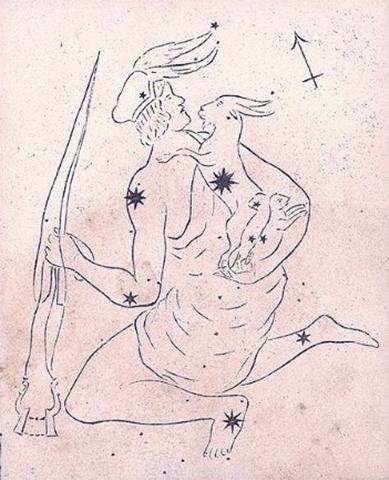189. The 3rd glyph line on
side b could then evidently have
referred to where the Rigel year was beginning,
i.e. to the place when Rigel and Capella were
together at the Full
Moon:
... In view of the almost universal
prevalence of the Pleiades year throughout
the Polynesian area it is surprising to find
that in the South Island and certain parts
of the North Island of New Zealand and in
the neighboring Chatham Islands, the year
began with the new Moon after the yearly
morning rising, not of the Pleiades, but of
the star Rigel in Orion ...
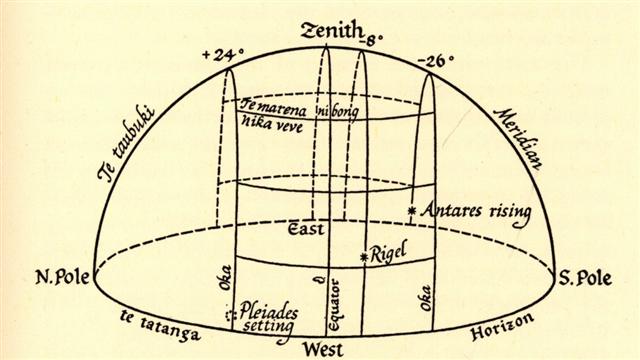
... Colonists who arrived in New Zealand
from Central Polynesia during the Middle
Ages and intermarried with the tangata
whenua, 'people of the land', found
themselves between the horns of a
calendrical dilemma. They must either
convert the aborigines to the Pleiades year
beginning in November-December or themselves
adopt the Rigel year [together with heliacal
rising observations] and bring down the
wrath of their ancestors on their own heads.
That there resulted a long and passionate
struggle on the part of both the invaders
and the invaded to retain their own the
integrity of the sacred year of their
traditions can hardly by doubted. The
outcome of the conflict proved that the
institution of the land was too firmly
established to be changed. While some tribes
retained the Rigel year in its entirety
others effected a compromise by retaining
the Pleiades year but commencing it in June
...
 |
 |
 |
 |
|
Cb2-22 |
Cb2-23 |
Cb2-24 (440) |
Cb2-25 (49) |
|
ku kikiu - i
te henua |
koia ra |
tagata tua ivi
- te henua |
tagata tua ivi - ki te henua |
|
INVISIBLY CLOSE TO THE SUN NORTH
OF THE EQUATOR: |
|
κ Ophiuchi (256.2), ζ Arae
(256.5), ε Arae (256.8),
CUJAM = ε Herculi
(256.9) |
no star listed (257) |
17h (258.7)
ARRAKIS
= μ Draconis
(258.7)
|
Mula-19
(The Root)
SABIK = η Ophiuchi
(259.7),
η Scorpii
(259.9) |
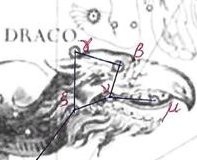 |
|
Dec 2 (336 = 2 * 168) |
3 |
4 |
5 |
|
"Oct 26 (295 = 336 - 41) |
27 |
28 |
29 |
|
CLOSE TO THE FULL MOON
ON EASTER ISLAND: |
|
π¹ Orionis (73.0), ο² Orionis
(73.4),
HASSALEH = ι Aurigae
(73.6), π6 Orionis (73.9) |
ALMAAZ (He Goat) = ε Aurigae
(74.7),
HAEDUS I
= ζ Aurigae
(74.8) |
HAEDUS II
= η Aurigae
(75.9) |
5h (76.1)
ε
Leporis (76.0),
CURSA
= β Eridani
(76.4), λ Eridani (76.7) |
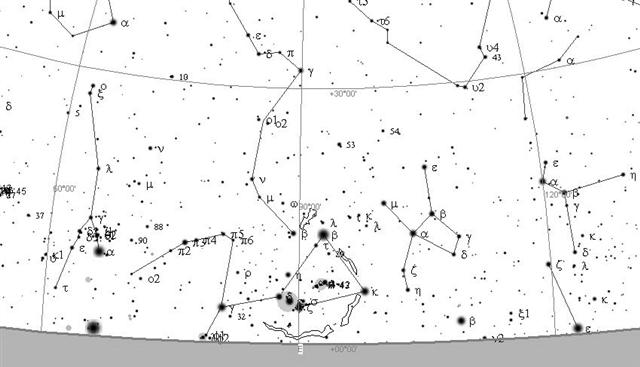 |
|
June 2 (366 - 183 = 153) |
3 |
4 |
5 |
|
"April 22 (*32 = *73 - *41) |
23 |
24 |
25 (115) |
|
... Later on in this series of
rituals, the Chorti go
through a ceremony they call
raising the sky. This ritual
takes place at midnight on the
twenty-fifth of April and
continues each night until the
rains arrive. In this ceremony
two diviners and their wives sit
on benches so that they occupy
the corner positions of the
cosmic square. They take their
seats in the same order as the
stones were placed, with the men
on the eastern side and the
women on the west. The ritual
actions of sitting down and
lifting upward are done with
great precision and care,
because they are directly
related to the actions done by
the gods at Creation. The people
represent the gods of the four
corners and the clouds that
cover the earth. As they rise
from their seats, they
metaphorically lift the sky. If
their lifting motion is uneven,
the rains will be irregular and
harmful ... |
 |
 |
 |
 |
 |
|
Cb3-1 (50) |
Cb3-2 (443) |
Cb3-3 |
Cb3-4 (445) |
Cb3-5 (54) |
|
E vae ra - ka
oho - ki te henua - kua huki |
ku kikiu - te
henua |
ko te henua -
te rima |
e kava |
i
haga rave ika |
|
... Traditionally, remark, the
kava root was chewed to
make the infusion: The
sacrificed child of the people
is cannibalized by the young
chiefs. The water of the kava,
however, has a different
symbolic provenance. The classic
Cakaudrove kava
chant, performed at the Lau
installation rites, refers to it
as sacred rain water from the
heavens ... This male and
chiefly water (semen) in the
womb of a kava bowl whose
feet are called 'breasts' (sucu)
.jpg)
and from the front of which,
tied to the upper part of an
inverted triangle, a sacred cord
stretches out toward the chief
... The cord is decorated with
small white cowries, not only a
sign of chieftainship but by
name, buli leka, a
continuation of the metaphor of
birth - buli, 'to form',
refers in Fijian procreation
theory to the conceptual
acception of the male in the
body of the woman. The
sacrificed child of the people
will thus give birth to the
chief. But only after the chief,
ferocious outside cannibal who
consumes the cannibalized
victim, has himself been
sacrificed by it. For when the
ruler drinks the sacred
offering, he is in the state of
intoxication Fijians call 'dead
from' (mateni) or 'dead
from kava' (mate ni
yaqona), to recover from
which is explicitly 'to live' (bula). This
accounts for the second cup the
chief is alone accorded, the cup
of fresh water. The god is
immediately revived, brought
again to life - in a transformed
state ... |
|
INVISIBLY CLOSE TO THE SUN NORTH
OF THE EQUATOR: |
|
NODUS I = ζ Draconis(260.0),
π Herculis (260.7),
RAS ALGETHI
= α Herculis
(260.8) |
SARIN = δ Herculis
(261.0), ο Ophiuchi (261.4)
ALRISHA (α Piscium)
|
ξ Ophiuchi (262.2), θ Ophiuchi,
ν Serpentis, ζ, ι Apodis
(262.4), ι Arae (262.8), ρ
Herculis (262.9) |
β, γ Arae (263.3), κ Arae
(263.5), σ Ophiuchi (263.6) |
LESATH (Sting) = ν Scorpii,
δ Arae (264.7),
CHOO = α Arae
(264.9) |
|
Dec 6 (340) |
7 |
8 |
9 |
10 (*264) |
|
ºDec 2 (336 = 2 * 168) |
3 |
4 |
5 |
6 (*260) |
|
'Nov 9 |
10 (314 → π) |
11 |
12 (*236) |
13 |
|
"Oct 30 |
31 (300) |
"Nov 1 |
2 |
3 (*157 = 314 / 2) |
|
OCT 3 (276 = 340 - 64) |
4 |
5 |
6 |
7 (*200) |
|
256 = 340 - 84 |
257 |
258 |
259 |
260 (*180) |
|
CLOSE TO THE FULL MOON
ON EASTER ISLAND: |
|
μ Aurigae, μ Leporis
(77.6) |
ĸ Leporis (78.0),
RIGEL
(Foot) = β Orionis
(78.1),
Flaming Star = IC405
(78.2),
CAPELLA
= α Aurigae
(78.4), ο Columbae, τ Orionis
(78.8) |
λ
Aurigae (79.0), λ Leporis
(79.6), ρ Aurigae (79.7)
ARCTURUS (α Bootis)
|
Shur-narkabti-sha-iltanu-5 (Star
in the Bull towards the north)
σ
Aurigae (80.4),
BELLATRIX = γ Orionis, SAIF AL
JABBAR = η Orionis
(80.7),
ELNATH
= β Tauri
(80.9) |
ψ
Orionis (81.1),
NIHAL = β Leporis
(81.7) |
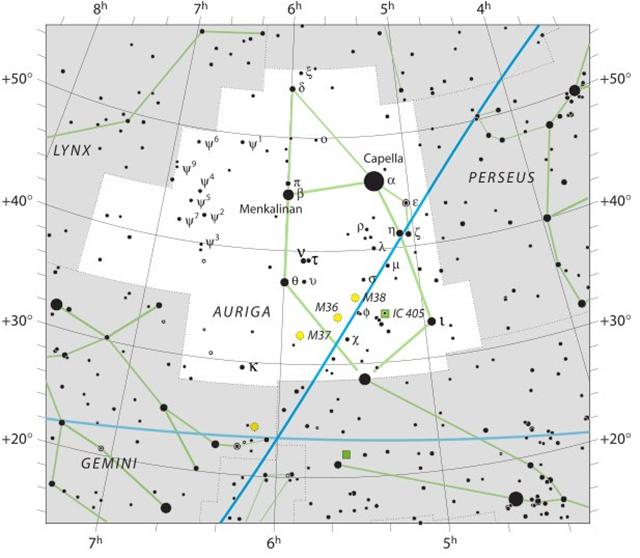 |
|
June 6 |
7 |
8 |
9 |
10 (161) |
|
ºJune 2 |
3 |
4 |
5 |
6 (157 = 80 + *77) |
|
'May 10 (130) |
11 |
12 |
13 |
14 |
|
"April 26 |
27 |
28 (118 = 4 * 29½) |
29 |
30 |
|
APRIL 3 (93) |
4 |
5 |
6 |
7 |
|
73 (→ π) |
74 |
75 |
76 |
77 (= 260 - 183) |
The pair of sitting figures at the end of
line Cb2 could refer to Auriga - to the
Charioteer who had lost his Horse and who
carried both the Mother Goat (Capella) and
her kids on his back :
|
Ivi.
1. Bone;
fishbone. 2. Ivi-tia,
sewing needle. 3.
Ivi tika, spine,
vertebra. 4. Ivi
atua, being of the
other world. 5. Ivi
tumu atua, seer,
wizard. 6. Ivi heheu
swordfish. Vanaga.
1. Bone, needle; ivi
ika, fishbone;
ivi ohio, needle;
ivi tika, fishbone,
backbone; kiko o te
ivi tika, pancreas;
ivi heheu,
cachalot; ivi
tupapaku, skeleton;
ivi uha, to grow
(of mankind); tooa te
kiko e ivi i hakarere,
to strip the flesh from
the bones; kai ivi,
to eat remnants; kore
te ivi, cooked too
much. 2. Parent, family,
ancestry. Churchill.
To
bend down to allow
someone to climb on
one's back to be carried
(haha);
he-ti-atu a Kaiga i te
tua ivi, he-haha-mai
Huri Avai, Kaiga
bent his back and Huri
Avai climbed on his
shoulders. Vanaga.
|
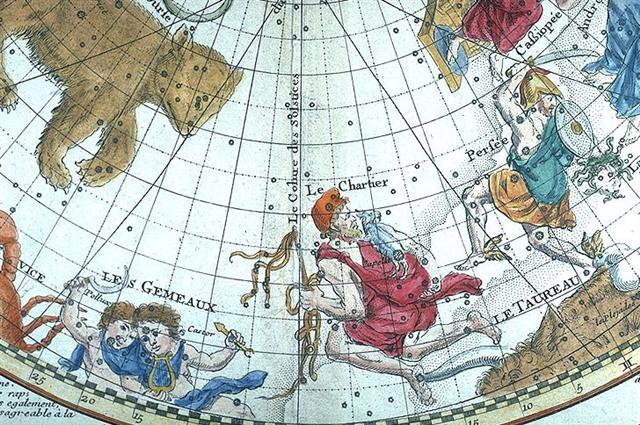
When
Alrisha culminated at 21h in day 341
(December 7) then Rigel and Capella were at
the Full Moon. When Rigel and Capella rose
with the Sun it was in day 341 - 183 = 158
(June 7).
|











.jpg)


